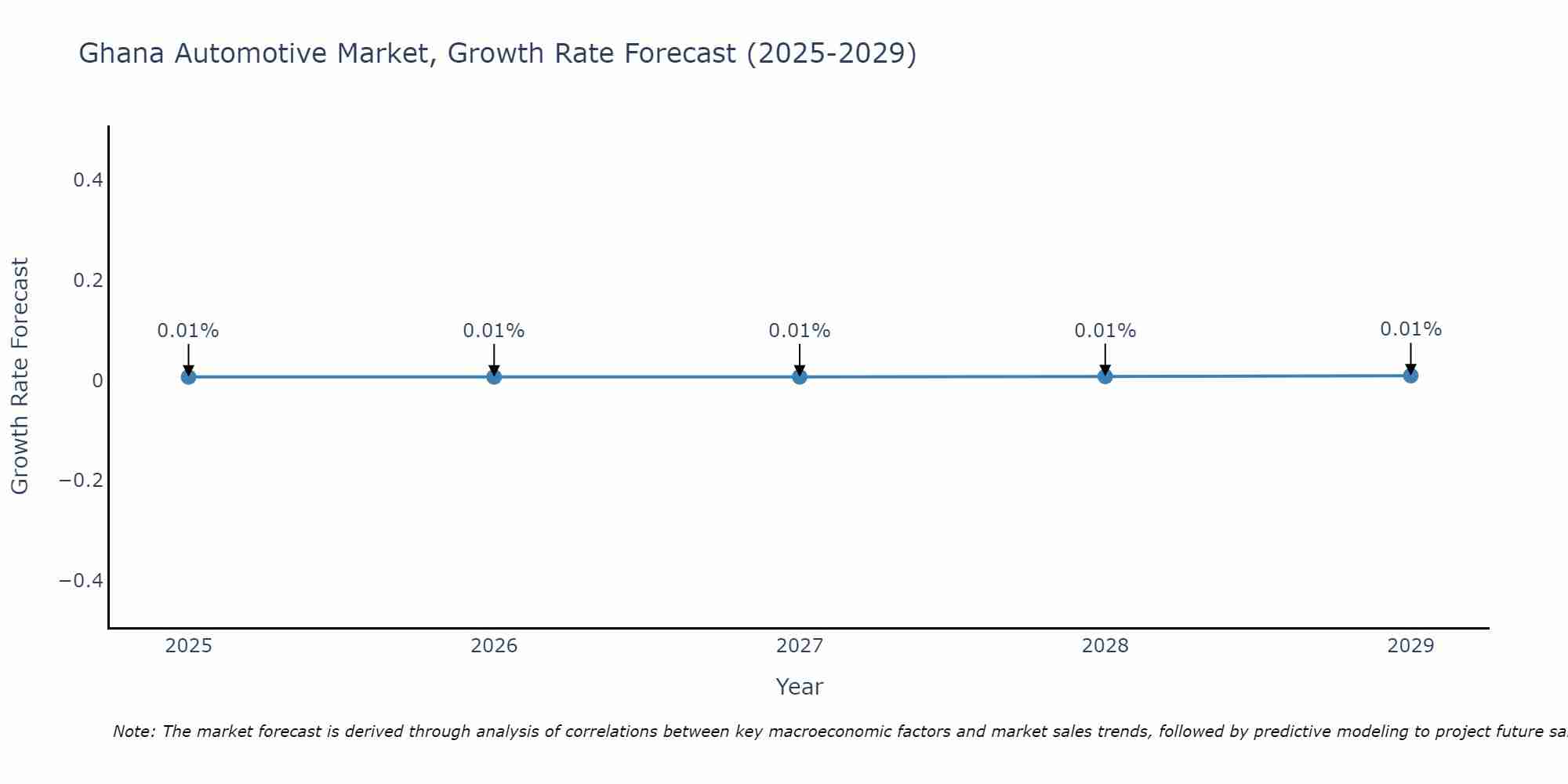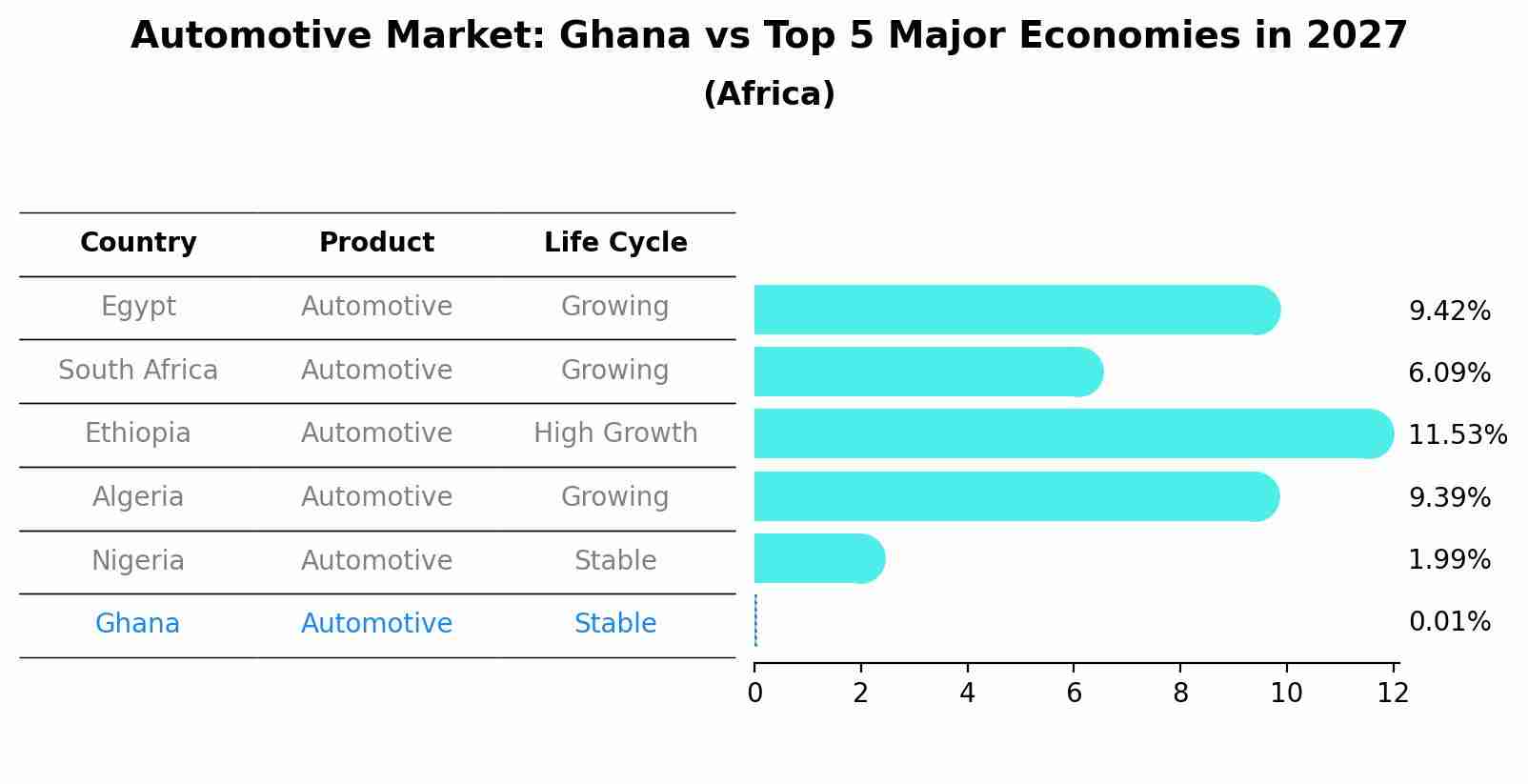Ghana Automotive Market (2025-2031) Outlook | Companies, Trends, Revenue, Value, Industry, Analysis, Forecast, Growth, Share & Size
| Product Code: ETC431812 | Publication Date: Oct 2022 | Updated Date: Jul 2025 | Product Type: Market Research Report | |
| Publisher: 6Wresearch | Author: Bhawna Singh | No. of Pages: 75 | No. of Figures: 35 | No. of Tables: 20 |
Ghana Automotive Market Size Growth Rate
The Ghana Automotive Market is poised for steady growth rate improvements from 2025 to 2029. Commencing at 0.01% in 2025, growth builds up to 0.01% by 2029.

Automotive Market: Ghana vs Top 5 Major Economies in 2027 (Africa)
By 2027, Ghana's Automotive market is forecasted to achieve a stable growth rate of 0.01%, with Egypt leading the Africa region, followed by South Africa, Ethiopia, Algeria and Nigeria.

Ghana Automotive Market Synopsis
The Ghanaian automotive market is witnessing steady growth driven by increasing urbanization, rising middle-class population, and improving economic conditions. The market is dominated by imported used vehicles due to high import duties on new vehicles. Japanese brands like Toyota and Nissan are popular choices among consumers for their reliability and affordability. However, European and American brands are also gaining traction in the market. The government`s initiatives to promote local assembly and manufacturing of vehicles are expected to boost the domestic automotive industry. Key challenges include inadequate infrastructure, lack of financing options, and high import tariffs. Overall, the Ghana automotive market presents opportunities for both international manufacturers looking to expand their presence in Africa and local players aiming to capitalize on the growing demand for vehicles.
Ghana Automotive Market Trends
The Ghana Automotive Market is experiencing a shift towards more environmentally friendly vehicles, with an increasing demand for hybrid and electric cars. This trend is driven by growing environmental awareness and government incentives for eco-friendly vehicles. Additionally, there is a rising preference for compact and fuel-efficient cars due to urban congestion and high fuel prices. The market is also witnessing a rise in the adoption of advanced safety features and connectivity technologies in vehicles. Furthermore, there is a growing interest in used cars imported from countries like the United States and Europe, offering consumers more options at competitive prices. Overall, the Ghana Automotive Market is evolving to meet changing consumer preferences towards sustainability, efficiency, and technological advancements.
Ghana Automotive Market Challenges
The Ghana Automotive Market faces challenges such as high import duties and taxes on vehicles, which drive up the overall cost for consumers. Additionally, the lack of a local manufacturing industry results in heavy reliance on imported vehicles, leading to limited options and higher prices. Poor road infrastructure and inconsistent supply of fuel also hinder the market`s growth and development. Furthermore, the prevalence of counterfeit spare parts and inadequate regulations on vehicle emissions contribute to maintenance issues and environmental concerns. Overall, these challenges create barriers to entry for both consumers and industry players, impacting the overall competitiveness and sustainability of the Ghana Automotive Market.
Ghana Automotive Market Investment Opportunities
The Ghana automotive market presents promising investment opportunities, with a growing demand for vehicles driven by a rising middle class and increased economic activity. Potential investments could focus on vehicle assembly plants to take advantage of the government`s policies aimed at promoting local manufacturing and reducing dependency on imports. Furthermore, investing in dealership networks and aftermarket services could be lucrative due to the need for reliable maintenance and repair services. Additionally, there is potential for investments in electric vehicles and alternative fuel technologies to align with the country`s sustainability goals and emerging trends in the global automotive market. Overall, the Ghana automotive market offers diverse investment avenues for both local and international investors looking to capitalize on the industry`s growth and potential.
Jordan Agar Market Government Policies
The Ghanaian government has implemented various policies to boost the automotive market in the country. These policies include the introduction of the Ghana Automotive Development Policy, which aims to promote local vehicle assembly and manufacturing through incentives such as tax breaks and import duty reductions on vehicle components. Additionally, the government has put in place regulations to ensure that only vehicles meeting certain local content requirements can be sold in the country. These policies are intended to stimulate the growth of the domestic automotive industry, create job opportunities, and reduce the country`s reliance on imported vehicles.
Ghana Automotive Market Future Outlook
The future outlook for the Ghana Automotive Market appears positive, driven by factors such as a growing middle class, increasing urbanization, and improving infrastructure. The demand for vehicles is expected to rise, particularly for passenger cars and commercial vehicles, as consumers seek more convenient transportation options and businesses expand their fleets. Additionally, the government`s initiatives to promote local vehicle assembly and manufacturing, along with favorable trade policies, are likely to attract more investment in the automotive sector. However, challenges such as high import tariffs, currency fluctuations, and competition from used car imports may impact the market`s growth potential. Overall, with the right strategies in place to address these challenges, the Ghana Automotive Market is poised for steady growth in the coming years.
Key Highlights of the Report:
- Ghana Automotive Market Outlook
- Market Size of Ghana Automotive Market, 2024
- Forecast of Ghana Automotive Market, 2031
- Historical Data and Forecast of Ghana Automotive Revenues & Volume for the Period 2021 - 2031
- Ghana Automotive Market Trend Evolution
- Ghana Automotive Market Drivers and Challenges
- Ghana Automotive Price Trends
- Ghana Automotive Porter's Five Forces
- Ghana Automotive Industry Life Cycle
- Historical Data and Forecast of Ghana Automotive Market Revenues & Volume By Product Type for the Period 2021 - 2031
- Historical Data and Forecast of Ghana Automotive Market Revenues & Volume By Electric for the Period 2021 - 2031
- Historical Data and Forecast of Ghana Automotive Market Revenues & Volume By Hybrid Electric for the Period 2021 - 2031
- Historical Data and Forecast of Ghana Automotive Market Revenues & Volume By Plug-In Hybrid Electric for the Period 2021 - 2031
- Historical Data and Forecast of Ghana Automotive Market Revenues & Volume By Mild Hybrid for the Period 2021 - 2031
- Historical Data and Forecast of Ghana Automotive Market Revenues & Volume By Natural Gas for the Period 2021 - 2031
- Historical Data and Forecast of Ghana Automotive Market Revenues & Volume By Fuel Cell Electric for the Period 2021 - 2031
- Historical Data and Forecast of Ghana Automotive Market Revenues & Volume By Diesel for the Period 2021 - 2031
- Historical Data and Forecast of Ghana Electric Automotive Market Revenues & Volume By Petrol for the Period 2021 - 2031
- Ghana Automotive Import Export Trade Statistics
- Market Opportunity Assessment By Product Type
- Ghana Automotive Top Companies Market Share
- Ghana Automotive Competitive Benchmarking By Technical and Operational Parameters
- Ghana Automotive Company Profiles
- Ghana Automotive Key Strategic Recommendations
Frequently Asked Questions About the Market Study (FAQs):
- Single User License$ 1,995
- Department License$ 2,400
- Site License$ 3,120
- Global License$ 3,795
Search
Thought Leadership and Analyst Meet
Our Clients
Related Reports
- Afghanistan Rocking Chairs And Adirondack Chairs Market (2026-2032) | Size & Revenue, Competitive Landscape, Share, Segmentation, Industry, Value, Outlook, Analysis, Trends, Growth, Forecast, Companies
- Afghanistan Apparel Market (2026-2032) | Growth, Outlook, Industry, Segmentation, Forecast, Size, Companies, Trends, Value, Share, Analysis & Revenue
- Canada Oil and Gas Market (2026-2032) | Share, Segmentation, Value, Industry, Trends, Forecast, Analysis, Size & Revenue, Growth, Competitive Landscape, Outlook, Companies
- Germany Breakfast Food Market (2026-2032) | Industry, Share, Growth, Size, Companies, Value, Analysis, Revenue, Trends, Forecast & Outlook
- Australia Briquette Market (2025-2031) | Growth, Size, Revenue, Forecast, Analysis, Trends, Value, Share, Industry & Companies
- Vietnam System Integrator Market (2025-2031) | Size, Companies, Analysis, Industry, Value, Forecast, Growth, Trends, Revenue & Share
- ASEAN and Thailand Brain Health Supplements Market (2025-2031) | Strategy, Consumer Insights, Analysis, Investment Trends, Opportunities, Growth, Size, Share, Industry, Revenue, Segments, Value, Segmentation, Supply, Forecast, Restraints, Outlook, Competition, Drivers, Trends, Demand, Pricing Analysis, Competitive, Strategic Insights, Companies, Challenges
- ASEAN Bearings Market (2025-2031) | Strategy, Consumer Insights, Analysis, Investment Trends, Opportunities, Growth, Size, Share, Industry, Revenue, Segments, Value, Segmentation, Supply, Forecast, Restraints, Outlook, Competition, Drivers, Trends, Demand, Pricing Analysis, Competitive, Strategic Insights, Companies, Challenges
- Europe Flooring Market (2025-2031) | Outlook, Share, Industry, Trends, Forecast, Companies, Revenue, Size, Analysis, Growth & Value
- Saudi Arabia Manlift Market (2025-2031) | Outlook, Size, Growth, Trends, Companies, Industry, Revenue, Value, Share, Forecast & Analysis
Industry Events and Analyst Meet
Whitepaper
- Middle East & Africa Commercial Security Market Click here to view more.
- Middle East & Africa Fire Safety Systems & Equipment Market Click here to view more.
- GCC Drone Market Click here to view more.
- Middle East Lighting Fixture Market Click here to view more.
- GCC Physical & Perimeter Security Market Click here to view more.
6WResearch In News
- Doha a strategic location for EV manufacturing hub: IPA Qatar
- Demand for luxury TVs surging in the GCC, says Samsung
- Empowering Growth: The Thriving Journey of Bangladesh’s Cable Industry
- Demand for luxury TVs surging in the GCC, says Samsung
- Video call with a traditional healer? Once unthinkable, it’s now common in South Africa
- Intelligent Buildings To Smooth GCC’s Path To Net Zero


















